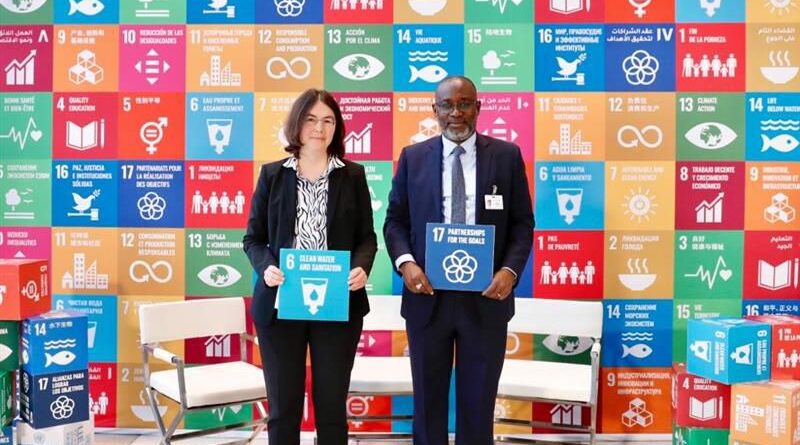Nigeria Officially Become 48th Member Of The UN Water Convention
By Bukar Bolori
Nigeria has taken a decisive step for cooperative water action by officially becoming the 48th Party to the Convention on the Protection and Use of Transboundary Watercourses and International Lakes (known as the UN Water Convention).
The decision was communicated to the rest of the world as leaders gather in New York for the milestone UN Water Conference, A statement by United Nations on Friday said: “Nigeria has taken a decisive step for cooperative water action by officially becoming the 48th Party to the Convention on the Protection and Use of Transboundary Watercourses and International Lakes (known as the UN Water Convention).”
In the statement Nigeria is noted to share at least one transboundary water body with each of its neighbouring states, making cooperation a key part of transformative action needed to address complex water challenges.
According to the statement, at a ceremony held on the opening day of the Conference, Nigeria’s Minister of Water Resources, Engr. Suleiman Adamu, stated that “as water and climate change know no borders, transboundary cooperation concerning climate change adaptation is necessary to prevent the possible negative effects of unilateral adaptation measures and enable the sharing of the costs and benefits of such collaboration.”
He recalled that “many transboundary basins that will be most severely affected by water scarcity and related climate change impacts are also, in parallel, impacted by political tensions, armed violence and internal water mismanagement, thus necessitating urgent efforts to build trust and strengthen cooperation on shared water issues.”
The Minister was also quoted to have said: “I am pleased to announce to you that the Federal Republic of Nigeria under the leadership of His Excellency, President Muhammadu Buhari has acceded to the Water Convention as an instrument to help strengthen our existing Transboundary commitments under the auspices of the Niger Basin Authority and the Lake Chad Basin Commission.”
The Executive Secretary of the United Nations Economic Commission for Europe(UNECE), Olga Algayerova and Convention Parties welcomed Nigeria as the 7th African nation to join the Convention since 2018 (following Chad, Senegal, Guinea-Bissau, Ghana, Togo and Cameroon). Nigeria’s accession further consolidates the strong momentum for water cooperation in Africa and worldwide.
More than 20 countries worldwide are in the process of joining the UN Water Convention, including around 15 in Africa – where over 90% of water resources are transboundary.
Nigeria, given its role as the largest economy and most populous nation in Africa – with over 213 million inhabitants – and position in key shared basins including both Lake Chad and the River Niger, Nigeria’s accession may inspire even more countries to join the Convention and reap its benefits through strengthened joint management of shared water resources, according to the statement.
The statement noted that the Lake Chad Basin is the largest inland drainage area in Africa and covers 8% of the continent’s total land area.
The basin extends through Algeria, Cameroon, Niger, Nigeria, Central Africa Republic, Chad, and Sudan. In Nigeria, the basin drains about 20% of the country.
However damming, overextraction, climate change, and drought are all contributing to the rapid depletion of Lake Chad, which has decreased in size by 90% over the last 60 years and has led to significant unemployment and insecurity challenges in the region.
Nigeria is also home to about 80% of the 100 million people residing in the basin of the Niger river, which crosses Algeria, Benin, Burkina Faso, Cameroon, Cote d’Ivoire, Guinea, Mali, Niger, Nigeria and Chad.
The Water Convention, whose secretariat is serviced by UNECE, is a unique and widely accepted intergovernmental legal framework. It requires Parties to prevent, control and reduce negative impacts on water quality and quantity across borders, to use shared waters in a reasonable and equitable way, and to ensure their sustainable management through cooperation. Parties bordering the same transboundary waters are obliged to cooperate by concluding specific agreements and establishing joint bodies.




